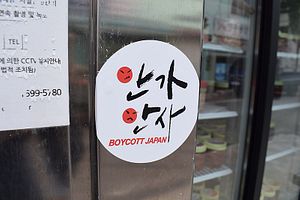It has been about a year since a nation-wide boycott movement toward Japanese products began in South Korea, triggered by a trade war between the two countries.
Contrary to some predictions that the boycott would not last long, it shows no sign of waning. According to a June 29 survey of 700 people over the age of 18 living across the country by Data Research, 75.9 percent of the respondents said they intend to continue the boycott in the future while 70.2 percent gave a positive view of the movement.
In sectors from automobiles to clothing, Japanese products are struggling in South Korea. Some companies are even leaving the country.
According to the Korea Customs Service, imports of Japanese consumer goods in the first four months of 2020 fell 37.2 percent year-on-year to $250 million. Total consumer goods imports also fell 9.5 percent, due to the COVID-19 pandemic’s impact on global trade, but the drop in imports of Japanese consumer goods is much larger.
In particular, imports of beer from Japan plunged just $772,000 in May 2020, a drop of 86 percent from May 2018. As of 2018, before the boycott set in, South Korea was the largest overseas market for the Japanese beer industry. However, sales of Japanese beer are in sharp decline after the anti-Japan movement.
Japanese car imports also dropped 58.7 percent to $62.1 million. Cars from Japan accounted for 10.6 percent of all South Korean car imports in February, but that share had dropped to just 5.5 percent in April. In addition, imports of almost all items, including Japanese motorcycles, ballpoint pens, golf clubs, toys, cosmetics, and fishing gear, plummeted.
Several big Japanese brands could not avoid the backlash. Nissan, Japan’s second-largest automaker, recently announced that it will withdraw from the South Korean market in December this year. It has been 16 years since the firm entered the market.
Nissan’s sales in the country fell 39.7 percent year-on-year to 3,049 units last year, with the deficit reaching 14 billion South Korean won ($11.7 million). Sales between January and April this year were also down 41.3 percent from last year. Nissan Korea said it would no longer be able to maintain sustainable growth in South Korea.
In addition, GU, a sister brand of Japanese casual wear designer, manufacturer, and retailer Uniqlo, will also suspend its offline store operations in South Korea in August. The online store will remain open until July, but after that, only a few products will be sold at Uniqlo’s online store.
The announced reasons are the impact of COVID-19 outbreak and the need for changes in the business structure, including a focus on e-commerce. However, it is evident that the company’s sales have been hit hard by the anti-Japan movement, too.
Even Olympus, a Japanese camera brand that has been hugely popular in South Korea, also closed its business in the country for the first time in more than two decades. The company explained that it tried to improve the profitability of the camera business, but has found it difficult to achieve results.
As the boycott takes a toll, some analysts are urging for trade conflicts that threaten the mutual economy to be resolved through diplomatic solutions.
The current trade structure has South Korea and Japan tightly bound together. For the past 60 years, South Korea has been importing intermediate goods from Japan and exporting finished products overseas. Now it is evident that some businesses could suffer a slowdown in growth if that structure is affected as a result of the prolonged boycott movement.
South Korean should also worry about possible domestic job losses. When Lotte Mart, a South Korean retail conglomerate, withdrew all of its products from China, more than 26,500 Chinese people lost their jobs as a result. Although no official numbers have been reported yet, the withdrawal of Japanese businesses from South Korea inevitably means there will be job losses.

































